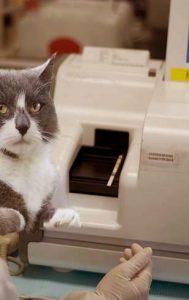
Why Is My Dog Or Cat’s AST Level High Or Low? – AST=Aspartate Transaminase aka SGOT
Ron Hines DVM PhD
 See What Normal Blood & Urine Values Are
See What Normal Blood & Urine Values Are
 Causes Of Most Abnormal Blood & Urine Tests
Causes Of Most Abnormal Blood & Urine Tests
 What To Do When My Dog Or Cat’s Liver Tests Are High?
What To Do When My Dog Or Cat’s Liver Tests Are High?
AST is an enzyme involved in amino acid construction and the rearrangement of amino acid components (transamination). Although it can be included in a standard veterinary “liver health” blood assay, AST is not only found in your pet’s liver. It is also found in quantity in the cells of your dog and cat’s heart, body muscles, kidney, brain and red blood cells. So, although it is often high when liver disease affects your pet, it can be high in many other non-liver-related problems. The ALT test is more liver-specific.
Health Problems That Can Cause AST Levels To Be Elevated In Your Pet’s Blood:
All infectious, toxic, metabolic and cancerous diseases that might affect your dog or cat’s liver can cause your pet’s AST blood level to rise. When the ALT level in the same blood sample is normal, red blood cell destruction is a common causes for high AST readings. Muscle damage due to heavy exertion or trauma can cause your pet’s AST level to rise. Congestive heart failure can also be responsible for elevated AST levels in dogs and cats. Bile duct obstruction can also increase AST level.
AST levels occasionally go up as the result of local reactions to vaccinations and intramuscular injections of all kinds. In dogs, AST levels are often increased during heartworm treatment with Immiticide® or Diroban® (melarsomine dihydrochloride). A hemolyzed blood sample can also result in a falsely high AST reading.
Health Problems That Can Cause AST Levels To Be Low:
Flagyl® (metronidazole) has been known to cause low AST readings. So has a vitamin B6 deficiency.
Complementary tests:
ALT, bilirubin, bile acids, hematocrit/Hct, GDH, CK. In cats check for a total protein/TP and globulin elevation as possible evidence of early FIP. Abdominal ultrasound. It is always wise to retest asymptomatic dogs in 2 days and cats in 1 day to confirm that a problem actually exists.
DxMe
You are on the Vetspace animal health website
Visiting the products that you see displayed on this website help pay the cost of keeping these articles on the Internet.

